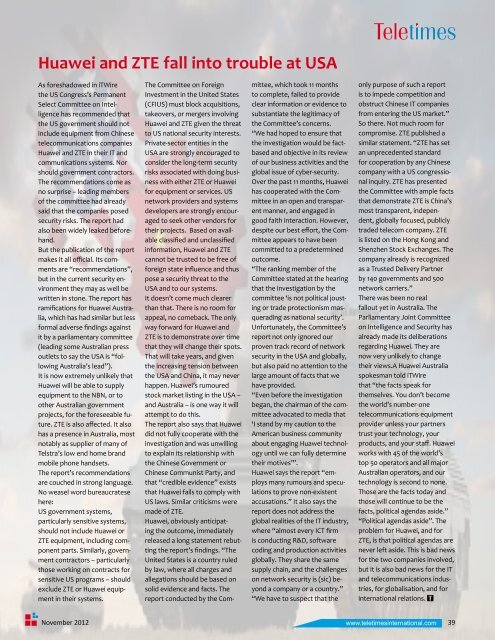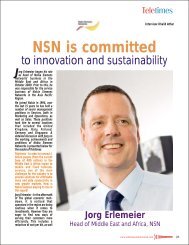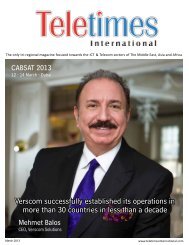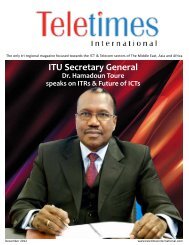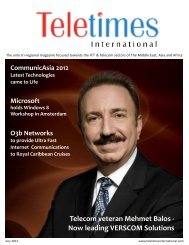GITEX 2012 INTERVIEWS ITU TELECOM World 2012 - Teletimes
GITEX 2012 INTERVIEWS ITU TELECOM World 2012 - Teletimes
GITEX 2012 INTERVIEWS ITU TELECOM World 2012 - Teletimes
You also want an ePaper? Increase the reach of your titles
YUMPU automatically turns print PDFs into web optimized ePapers that Google loves.
Huawei and ZTE fall into trouble at USAAs foreshadowed in iTWirethe US Congress’s PermanentSelect Committee on Intelligencehas recommended thatthe US government should notinclude equipment from Chinesetelecommunications companiesHuawei and ZTE in their IT andcommunications systems. Norshould government contractors.The recommendations come asno surprise – leading membersof the committee had alreadysaid that the companies posedsecurity risks. The report hadalso been widely leaked beforehand.But the publication of the reportmakes it all official. Its commentsare “recommendations”,but in the current security environmentthey may as well bewritten in stone. The report hasramifications for Huawei Australia,which has had similar but lessformal adverse findings againstit by a parliamentary committee(leading some Australian pressoutlets to say the USA is “followingAustralia’s lead”).It is now extremely unlikely thatHuawei will be able to supplyequipment to the NBN, or toother Australian governmentprojects, for the foreseeable future.ZTE is also affected. It alsohas a presence in Australia, mostnotably as supplier of many ofTelstra’s low end home brandmobile phone handsets.The report’s recommendationsare couched in strong language.No weasel word bureaucratesehere:US government systems,particularly sensitive systems,should not include Huawei orZTE equipment, including componentparts. Similarly, governmentcontractors – particularlythose working on contracts forsensitive US programs – shouldexclude ZTE or Huawei equipmentin their systems.The Committee on ForeignInvestment in the United States(CFIUS) must block acquisitions,takeovers, or mergers involvingHuawei and ZTE given the threatto US national security interests.Private-sector entities in theUSA are strongly encouraged toconsider the long-term securityrisks associated with doing businesswith either ZTE or Huaweifor equipment or services. USnetwork providers and systemsdevelopers are strongly encouragedto seek other vendors fortheir projects. Based on availableclassified and unclassifiedinformation, Huawei and ZTEcannot be trusted to be free offoreign state influence and thuspose a security threat to theUSA and to our systems.It doesn’t come much clearerthan that. There is no room forappeal, no comeback. The onlyway forward for Huawei andZTE is to demonstrate over timethat they will change their spots.That will take years, and giventhe increasing tension betweenthe USA and China, it may neverhappen. Huawei’s rumouredstock market listing in the USA –and Australia – is one way it willattempt to do this.The report also says that Huaweidid not fully cooperate with theinvestigation and was unwillingto explain its relationship withthe Chinese Government orChinese Communist Party, andthat “credible evidence” existsthat Huawei fails to comply withUS laws. Similar criticisms weremade of ZTE.Huawei, obviously anticipatingthe outcome, immediatelyreleased a long statement rebuttingthe report’s findings. “TheUnited States is a country ruledby law, where all charges andallegations should be based onsolid evidence and facts. Thereport conducted by the Committee,which took 11 monthsto complete, failed to provideclear information or evidence tosubstantiate the legitimacy ofthe Committee’s concerns.“We had hoped to ensure thatthe investigation would be factbasedand objective in its reviewof our business activities and theglobal issue of cyber-security.Over the past 11 months, Huaweihas cooperated with the Committeein an open and transparentmanner, and engaged ingood faith interaction. However,despite our best effort, the Committeeappears to have beencommitted to a predeterminedoutcome.“The ranking member of theCommittee stated at the hearingthat the investigation by thecommittee ‘is not political joustingor trade protectionism masqueradingas national security’.Unfortunately, the Committee’sreport not only ignored ourproven track record of networksecurity in the USA and globally,but also paid no attention to thelarge amount of facts that wehave provided.“Even before the investigationbegan, the chairman of the committeeadvocated to media that‘I stand by my caution to theAmerican business communityabout engaging Huawei technologyuntil we can fully determinetheir motives’”.Huawei says the report “employsmany rumours and speculationsto prove non-existentaccusations.” It also says thereport does not address theglobal realities of the IT industry,where “almost every ICT firmis conducting R&D, softwarecoding and production activitiesglobally. They share the samesupply chain, and the challengeson network security is (sic) beyonda company or a country.”“We have to suspect that theonly purpose of such a reportis to impede competition andobstruct Chinese IT companiesfrom entering the US market.”So there. Not much room forcompromise. ZTE published asimilar statement. “ZTE has setan unprecedented standardfor cooperation by any Chinesecompany with a US congressionalinquiry. ZTE has presentedthe Committee with ample factsthat demonstrate ZTE is China’smost transparent, independent,globally focused, publiclytraded telecom company. ZTEis listed on the Hong Kong andShenzhen Stock Exchanges. Thecompany already is recognizedas a Trusted Delivery Partnerby 140 governments and 500network carriers.”There was been no realfallout yet in Australia. TheParliamentary Joint Committeeon Intelligence and Security hasalready made its deliberationsregarding Huawei. They arenow very unlikely to changetheir views.A Huawei Australiaspokesman told iTWirethat “the facts speak forthemselves. You don’t becomethe world’s number-onetelecommunications equipmentprovider unless your partnerstrust your technology, yourproducts, and your staff. Huaweiworks with 45 of the world’stop 50 operators and all majorAustralian operators, and ourtechnology is second to none.Those are the facts today andthose will continue to be thefacts, political agendas aside.”“Political agendas aside”. Theproblem for Huawei, and forZTE, is that political agendas arenever left aside. This is bad newsfor the two companies involved,but it is also bad news for the ITand telecommunications industries,for globalisation, and forinternational relations.November <strong>2012</strong>www.teletimesinternational.com39


